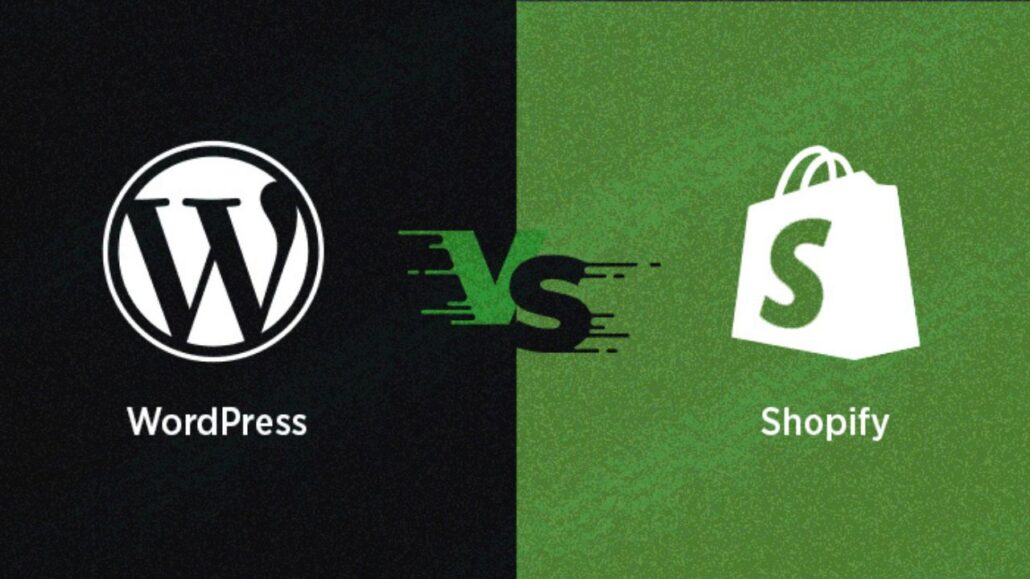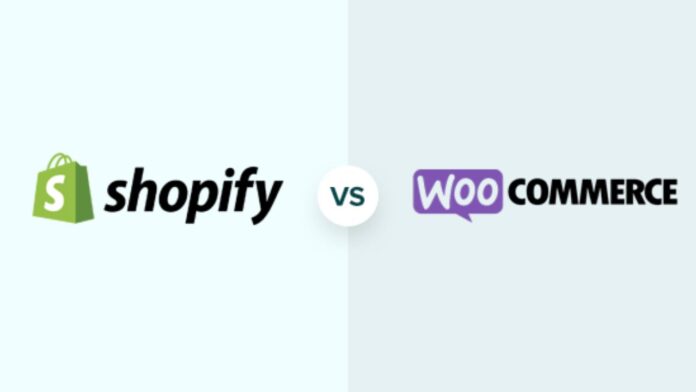E-commerce has become an indispensable part of today’s business landscape, and choosing the right platform is crucial for success.
Shopify and WooCommerce are two of the most popular e-commerce platforms, each offering unique features and advantages. In this article, we’ll delve into a detailed comparison of Shopify and WooCommerce, helping you determine the best fit for your business.
Shopify: A Comprehensive Overview

Shopify is a leading e-commerce platform known for its user-friendly interface and extensive feature set. It provides a hassle-free way to set up and manage an online store without requiring advanced technical skills.
WooCommerce: A Comprehensive Overview
WooCommerce, on the other hand, is a plugin for WordPress that transforms a website into a powerful e-commerce store. It offers a high level of customization and flexibility, making it a popular choice for businesses seeking tailored solutions.
Ease of Setup and Use
Setting up an online store is a critical first step for any business. Shopify offers a straightforward setup process with intuitive controls, making it easy for even beginners to get started. In contrast, WooCommerce’s initial setup might require some technical knowledge, particularly if you’re new to WordPress.
Design and Customization
Shopify offers a wide range of professionally designed themes and templates, allowing users to create visually appealing stores with ease. Customization options are user-friendly, making it simple to modify layouts, colors, and fonts to align with your brand.
WooCommerce, being a WordPress plugin, provides extensive customization capabilities. Users have the freedom to design their store using various themes and plugins available within the WordPress ecosystem, resulting in highly personalized websites.
E-commerce Functionality
Shopify offers robust e-commerce functionality, including inventory management, product variants, and order processing. Its user-friendly dashboard simplifies the management of products and orders, making it suitable for businesses of all sizes.
WooCommerce, being built on top of WordPress, offers a vast array of plugins for enhanced functionality. It allows for intricate product variations, comprehensive inventory management, and seamless order processing.
Scalability and Growth
Shopify is renowned for its scalability, ensuring that your online store can handle increased traffic and sales as your business grows. It offers various plans to accommodate small startups and large enterprises.
WooCommerce also provides scalability options by leveraging the power of WordPress plugins. As your business expands, you can integrate additional features and scale your store accordingly.
Payment Gateways and Transaction Fees
Shopify offers a wide range of payment gateways, including Shopify Payments, which has competitive transaction fees. However, transaction fees may apply if you choose an external payment gateway.
WooCommerce does not charge transaction fees for sales made through your store, giving you more control over your payment options. You can integrate multiple payment gateways to offer convenience to your customers.
SEO and Marketing Capabilities
Shopify comes with built-in SEO features, allowing you to optimize your online store for search engines easily. It offers customizable meta tags, sitemaps, and a clean URL structure.
WooCommerce, being a WordPress plugin, benefits from the SEO capabilities inherent to WordPress. Additionally, various SEO plugins can further enhance your store’s visibility and search engine rankings.
Customer Support and Community
Shopify offers 24/7 customer support through multiple channels, including email, phone, and live chat. Additionally, there’s an active community and extensive documentation available to assist users.
WooCommerce benefits from the vast WordPress community, offering a plethora of tutorials, forums, and user-contributed content. While it doesn’t provide direct support, the community is robust and usually quick to address queries.
Security and Data Protection
Shopify takes security seriously and provides SSL encryption, secure payments, and automatic backups to ensure data safety. It offers peace of mind to both store owners and customers.
WooCommerce’s security relies on the security measures of the hosting environment and WordPress. Ensuring a secure hosting environment is crucial for protecting customer data and maintaining trust.
Pricing Comparison
Shopify offers various pricing plans, starting from the Basic Shopify plan to the Advanced Shopify plan, catering to different business needs. The pricing includes hosting and a range of features.
WooCommerce is a free plugin, but you’ll need to consider costs for hosting, domain registration, and any additional plugins or themes you choose to enhance functionality and appearance.
Case Studies and Success Stories
Numerous businesses have found success using Shopify. For example, Gymshark, a fitness apparel and accessories brand, witnessed exponential growth in sales after migrating to Shopify, showcasing the platform’s potential for business growth.
On the other hand, WooCommerce has empowered businesses like WPBeginner, a leading WordPress resource site, to monetize their content effectively while maintaining full control over their online store’s functionality and design.
Pros and Cons Summary
After a comprehensive comparison, here’s a summary of the pros and cons of both platforms to help you make an informed decision:
Shopify
Pros:
- User-friendly interface
- Extensive design options
- Strong e-commerce functionality
- Excellent scalability
- 24/7 customer support
Cons:
- Transaction fees for external payment gateways
- Monthly subscription costs
WooCommerce
Pros:
- High level of customization
- Extensive WordPress plugin ecosystem
- No transaction fees
- Strong SEO capabilities
- Cost-effective (plugin is free)
Cons:
- Requires WordPress knowledge
- Potential for plugin conflicts
Shopify vs WooCommerce Comparison
Shopify and WooCommerce are two popular e-commerce platforms used to create and manage online stores. While Shopify is an all-in-one hosted solution, WooCommerce is a WordPress plugin that adds e-commerce functionality to an existing WordPress site.
Shopify vs WooCommerce Pros and Cons
Shopify:
Pros: Easy to set up and use, excellent design options, reliable hosting, a wide range of apps and themes, and dedicated support.
Cons: Monthly subscription fees, transaction fees for third-party payment gateways, limited customization for non-coders.
WooCommerce:
Pros: Flexibility and customization options, cost-effective (especially for small businesses), a vast range of plugins and themes, integrated with WordPress, no transaction fees.
Cons: Requires a WordPress site, might need additional plugins for certain features, potential security concerns.
Shopify vs WooCommerce Pricing
Shopify: Offers various pricing plans, starting from $29 per month (Basic Shopify) to $299 per month (Advanced Shopify). Transaction fees apply for using third-party payment gateways.
WooCommerce: WooCommerce itself is free, but you’ll need to pay for hosting, a domain, and possibly themes or extensions. Costs can vary based on your requirements and the hosting provider you choose.
Shopify vs WooCommerce Features
Shopify: Robust built-in features, including a variety of payment gateways, unlimited products, customizable themes, abandoned cart recovery, inventory management, and more. Offers an app store for additional features.
WooCommerce: Extensive customization options, inventory management, various payment gateways, SEO-friendly, tax and shipping options, and the ability to integrate with numerous plugins.
Shopify vs WooCommerce Ease of Use
Shopify: Known for its user-friendly interface, easy setup, and intuitive dashboard. Ideal for those who need more technical skills or experience in web development.
WooCommerce: Requires some familiarity with WordPress and basic technical skills. It may be more complex for beginners, but it offers more flexibility for those with WordPress experience.
Shopify vs WooCommerce: Which is Better
The choice between Shopify and WooCommerce depends on your specific needs and preferences. Shopify is great for beginners or those looking for an easy, all-in-one solution. WooCommerce is excellent for those who prefer customization and have experience with WordPress.
Shopify vs WooCommerce for E-commerce
Both platforms are highly effective for e-commerce. Shopify is ideal for those seeking a hassle-free, complete e-commerce solution. WooCommerce is best for those who want extensive customization options and control over their online store.
Shopify vs WooCommerce for Dropshipping
Both platforms support dropshipping, but Shopify is often preferred due to its seamless integration with popular dropshipping apps and services, making it easier for dropshippers to manage their stores.
Shopify vs WooCommerce SEO
Both platforms offer solid SEO capabilities. Shopify provides SEO-friendly features and customizable meta tags. WooCommerce, integrated with WordPress, offers excellent SEO plugins, allowing for comprehensive optimization.
Shopify vs WooCommerce Plugin Comparison

Shopify: Offers a wide range of apps in its app store, covering various functionalities like marketing, inventory management, customer service, and more.
WooCommerce: Offers a vast library of plugins, including extensions for payment gateways, shipping, SEO, analytics, and many other aspects of e-commerce due to its integration with WordPress.
Conclusion
Choosing the right e-commerce platform depends on your business needs, technical expertise, and budget. If you prioritize ease of use, a comprehensive feature set, and excellent customer support, Shopify might be the right fit for you.
On the other hand, if you prefer a high level of customization and already utilize WordPress, WooCommerce could be the ideal choice.
FAQ:
Which Platform is Better for Beginners: Shopify or WooCommerce?
For beginners, Shopify is often considered easier to set up and use due to its user-friendly interface and extensive support resources.
Can I Use WooCommerce Without WordPress?
No, WooCommerce is a WordPress plugin and requires a WordPress website to function.
Do I Need Coding Skills to Customize My Store on Shopify?
No, Shopify provides a user-friendly interface that allows customization without requiring coding skills. However, some advanced customization might benefit from basic HTML/CSS knowledge.
Are There any Transaction Fees With WooCommerce?
WooCommerce does not charge transaction fees for sales made through your store. However, payment gateways may have their transaction fees.
Can I Migrate from Shopify to WooCommerce or Vice Versa?
Yes, it’s possible to migrate from one platform to the other, although the process may require careful consideration and planning to ensure a smooth transition.



